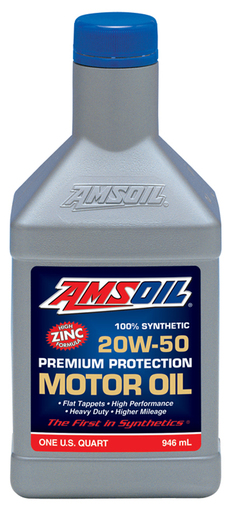I found this on another website, it may be helpful:
BOTTOM LINE: Running an old engine without zinc in the oil is bad news-- especially when breaking in a fresh build. Ask around and you'll hear about high rates of camshafts going flat. Avoid the problem by choosing the right oil-- that has a zinc content of at least .11%. If you're running zero zinc content oil in an old engine, I believe you're asking for trouble.
I've done some research. Here is the zinc content of todays oils:
20W-50
AMSOIL (old) none
AMSOIL (new) none
Castrol GTX .12
Exxon High Performance .11
Havoline Formula 3 none
Kendall GT-1 .16
Pennzoil GT Perf. none
Quaker State Dlx. none
Red Line none
Shell Truck Guard .15
Spectro Golden 4 .15
Spectro Golden M.G. .13
Unocal .12
Valvoline All Climate .11
Valvoline Turbo .13
Valvoline Race .20
Valvoline Synthetic .12
20W-40
AMSOIL none
Castrol Multi-Grade .12
Quaker State none
15W-50
Chevron .11
Mobil 1 none
Mystic JT8 .15
Red Line none
5W-50
Castrol Syntec .10
Quaker State Synquest none
Pennzoil Performax none
5W-40
Havoline none
15W-40
AMSOIL (old) none
AMSOIL (new) none
Castrol .14
Chevron Delo 400 none
Exxon XD3 .14
Exxon XD3 Extra .13
Kendall GT-1 .16
Mystic JT8 .15
Red Line none
Shell Rotella w/XLA .13
Valvoline All Fleet .15
Valvoline Turbo .13
10W-30
AMSOIL (old) none
AMSOIL (new) none
Castrol GTX .12
Chevron Supreme .11
Exxon Superflo Hi Perf 135 .11
Exxon Superflo Supreme 133 .13
Havoline Formula 3 none
Kendall GT-1 .16
Mobil 1 none
Pennzoil PLZ Turbo none
Quaker State none
Red Line none
Shell Fire and Ice .12
Shell Super 2000 .13
Shell Truck Guard .15
Spectro Golden M.G. none
Unocal Super .12
Valvoline All Climate .11
Valvoline Turbo .13
Valvoline Race .20
Valvoline Synthetic .12
5W-30
AMSOIL (old) none
AMSOIL (new) none
Castrol GTX .12
Chevron Supreme .11
Chevron Supreme Synt. .12
Exxon Superflow HP .11
Havoline Formula 3 none
Mobil 1 none
Mystic JT8 .1
Quaker State none
Red Line none
Shell Fire and Ice .12
Unocal .12
Valvoline All Climate .11
Valvoline Turbo .13
Valvoline Synthetic .12
BOTTOM LINE: Running an old engine without zinc in the oil is bad news-- especially when breaking in a fresh build. Ask around and you'll hear about high rates of camshafts going flat. Avoid the problem by choosing the right oil-- that has a zinc content of at least .11%. If you're running zero zinc content oil in an old engine, I believe you're asking for trouble.
I've done some research. Here is the zinc content of todays oils:
20W-50
AMSOIL (old) none
AMSOIL (new) none
Castrol GTX .12
Exxon High Performance .11
Havoline Formula 3 none
Kendall GT-1 .16
Pennzoil GT Perf. none
Quaker State Dlx. none
Red Line none
Shell Truck Guard .15
Spectro Golden 4 .15
Spectro Golden M.G. .13
Unocal .12
Valvoline All Climate .11
Valvoline Turbo .13
Valvoline Race .20
Valvoline Synthetic .12
20W-40
AMSOIL none
Castrol Multi-Grade .12
Quaker State none
15W-50
Chevron .11
Mobil 1 none
Mystic JT8 .15
Red Line none
5W-50
Castrol Syntec .10
Quaker State Synquest none
Pennzoil Performax none
5W-40
Havoline none
15W-40
AMSOIL (old) none
AMSOIL (new) none
Castrol .14
Chevron Delo 400 none
Exxon XD3 .14
Exxon XD3 Extra .13
Kendall GT-1 .16
Mystic JT8 .15
Red Line none
Shell Rotella w/XLA .13
Valvoline All Fleet .15
Valvoline Turbo .13
10W-30
AMSOIL (old) none
AMSOIL (new) none
Castrol GTX .12
Chevron Supreme .11
Exxon Superflo Hi Perf 135 .11
Exxon Superflo Supreme 133 .13
Havoline Formula 3 none
Kendall GT-1 .16
Mobil 1 none
Pennzoil PLZ Turbo none
Quaker State none
Red Line none
Shell Fire and Ice .12
Shell Super 2000 .13
Shell Truck Guard .15
Spectro Golden M.G. none
Unocal Super .12
Valvoline All Climate .11
Valvoline Turbo .13
Valvoline Race .20
Valvoline Synthetic .12
5W-30
AMSOIL (old) none
AMSOIL (new) none
Castrol GTX .12
Chevron Supreme .11
Chevron Supreme Synt. .12
Exxon Superflow HP .11
Havoline Formula 3 none
Mobil 1 none
Mystic JT8 .1
Quaker State none
Red Line none
Shell Fire and Ice .12
Unocal .12
Valvoline All Climate .11
Valvoline Turbo .13
Valvoline Synthetic .12


